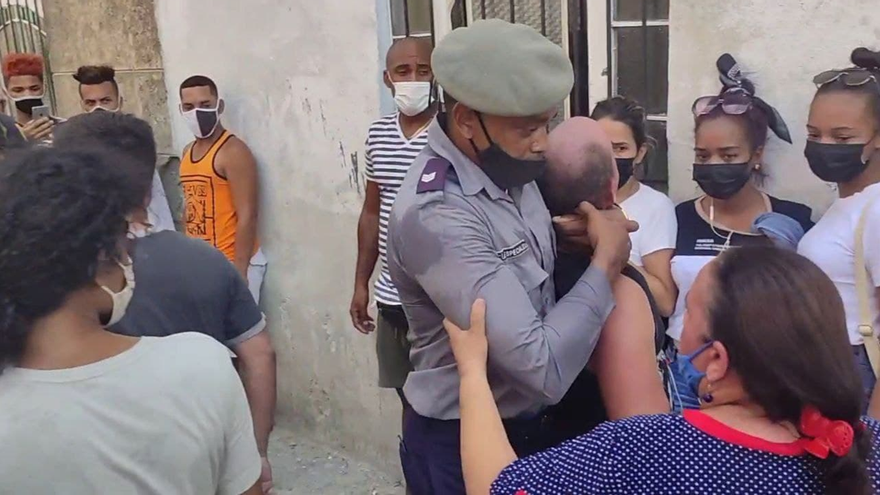
![]() 14ymedio, Havana, 8 February 2022 — Around three in the afternoon last Friday, when the trial of 33 of the July 11th protestors in the Municipal Court of Diez de Octubre, in Havana was almost over, one of them stood up and shouted for freedom for all.
14ymedio, Havana, 8 February 2022 — Around three in the afternoon last Friday, when the trial of 33 of the July 11th protestors in the Municipal Court of Diez de Octubre, in Havana was almost over, one of them stood up and shouted for freedom for all.
On seeing the unusual gesture, according to Yudinela Castro Pérez, the mother of 18-year-old Rowland Jesús Castillo, one of the defendants, tells 14ymedio, “immediately, the relatives began to applaud and they took us out of the room together with the defense attorneys.“
Castro, present that day in court, as on Tuesday and Wednesday, considers that the defendants’ defense attorneys “did a very good job.”
“They defended the young people one hundred percent, they fought hard,” the woman stresses to this newspaper, who expects the sentences to be announced this week, “because at most they said it could take up to five business days.”
On Wednesday, the Prosecutor’s Office had lowered the sentences requested for the youngest of the group, including that of Rowland Jesús Castillo Castro, who initially faced 23 years in prison, which was reduced to 12 years. “I am hopeful, because hope is the last thing that is lost, that the sentence against my son continues to fall.”
“Still, I feel heartbroken, because these seven months that he has already serves in prison, he should not have spent them in prison,” says the mother. “My son took to the streets to ask for freedom, to express what every person has the right to express. It was his feeling as well as that of all the young people who went out that day.”
Even if his sentence were lowered “to one year,” Castro argues, she still wouldn’t agree: “I’m going to continue fighting and demanding his freedom, no matter what it costs me.”
Her attitude, however, is not common among relatives of other defendants. “Other mothers are also complaining, but I have seen several who have become afraid of the threats from State Security and have remained silent,” she says.
The woman, who suffers from leukemia, emphasizes that she is going to count on strength she does not have to get her son out of jail: “My son is not a criminal, he is a wrestling athlete with several medals. He is not a murderer , he did not kill anyone so that they ask for that sentence.”
On the day of the trial, “when it was his turn to speak,” Castro narrates, the young Rowland “clearly said that he did not regret anything he had done, but that all he wanted was to be free, continue his studies so he could help me in the midst of my illness and be by the side of his own son, who needs him.”
Yudinela Castro has the care of her grandson, a little over a year and a half old, who “hasn’t seen his father for seven months.” This Monday, the mother was able to see her son at the Juan Manuel Márquez Pediatric Hospital, where he went to receive treatment for two inguinal hernias. “I hope to be able to see him again on February 10, when I have my statutory visit at the Prison for Young Minors in the West of Guatao.”
“When we left the Court on Friday, there was a strong operation outside the court, a cordon that made it seem that I was a fugitive from justice, because they say that I am relating to counterrevolutionary and terrorist people,” she protests. “But I have every right to ask for my son’s freedom.”
On Tuesday “there was a lot of lack of control” in the testimonies of the police officers who testified because “each one said something different.” The mother, however, points out that all the officers “seemed to have agreed on one point, and it was that they had not been given pistols to attend the marches, that they were not armed.”
This outraged her, “because in many videos that are circulating in the streets you can see when the police shoot at the protesters and the violent way in which they confront the young people,” some images, she asserts, that were not broadcast during the trial.
As for the support he is receiving, it is uneven. In her neighborhood, she says, people reject her: “Before I had friends who came to my house and now they don’t even call me on the phone because they say my line is tapped.” However, in Santos Suárez, where Rowland participated in the protest on 11J and where her father lives — and where, by the way, one of the last graffiti against Miguel Díaz-Canel appeared — it is different: “The neighbors show a lot of concern.”
____________
COLLABORATE WITH OUR WORK: The 14ymedio team is committed to practicing serious journalism that reflects Cuba’s reality in all its depth. Thank you for joining us on this long journey. We invite you to continue supporting us by becoming a member of 14ymedio now. Together we can continue transforming journalism in Cuba.
